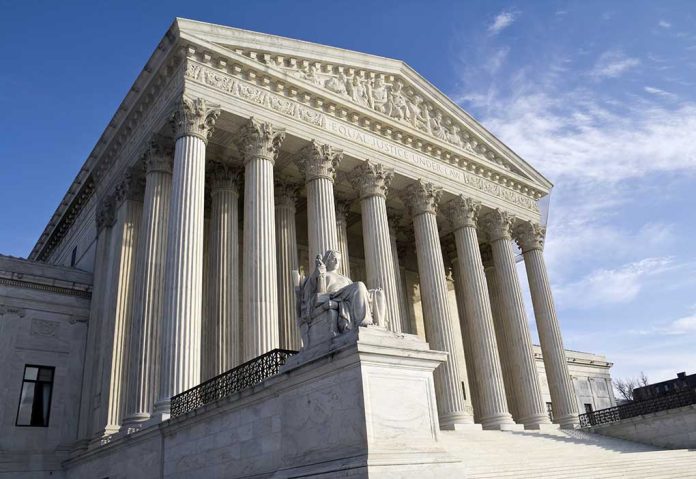
The Supreme Court’s refusal to hear a GOP challenge to President Biden’s voter registration order marks a significant victory for federal election initiatives.
At a Glance
- Supreme Court declines to hear Republican challenge to Biden’s voter registration executive order
- GOP lawmakers argued the order unconstitutionally interferes with state election powers
- Lower courts had previously dismissed the lawsuit due to lack of standing
- Decision upholds federal efforts to increase voter registration through government agencies
- Court also rejected appeals related to unfounded claims about Dominion Voting Systems
Supreme Court Rejects GOP Challenge to Biden’s Voter Registration Order
In a significant development for federal election policy, the Supreme Court has declined to entertain a challenge from Republican state lawmakers in Pennsylvania against President Biden’s executive order aimed at increasing voter registration. The order, which mandates federal agencies to provide voter registration services, has been a point of contention between the Biden administration and Republican officials who argue it oversteps presidential authority and infringes on states’ rights to control election procedures.
The case, known as Keefer, Dawn, et al. v. Biden, was brought by GOP lawmakers and officials who claimed the executive order would unfairly skew the electoral landscape in favor of Democrats. However, lower courts had already dismissed the lawsuit, citing a lack of standing. The Supreme Court’s decision not to hear the case effectively upholds these earlier rulings and validates the executive order’s implementation.
The Supreme Court on Monday turned away a challenge from Republican state lawmakers in Pennsylvania to a Biden administration executive order that is intended to boost voter registration. https://t.co/8htEXNMJNB
— NEWSMAX (@NEWSMAX) October 7, 2024
Implications for Federal and State Election Powers
This decision marks a crucial juncture in the ongoing debate over the balance of power between federal mandates and state autonomy in election management. The executive order, which aligns with the National Voter Registration Act of 1993, represents a federal push to increase voter turnout. Critics argue that such initiatives should remain under state control, while supporters view them as necessary steps to ensure broader voter access.
The Supreme Court’s refusal to intervene comes after it had already declined to expedite the case in May. This latest decision is part of a series of legal defeats for Republicans challenging voter laws and procedures, underscoring the judiciary’s reluctance to impede federal efforts to expand voter registration.
Broader Context of Election-Related Rulings
In addition to rejecting the challenge to Biden’s voter registration order, the Supreme Court also dismissed two separate appeals related to claims about Dominion Voting Systems. These appeals, which questioned the integrity of voting machines and alleged attempts to silence critics, were part of broader unfounded claims surrounding the 2020 election results.
The court’s decisions reflect a consistent stance against entertaining baseless election fraud claims and challenges to established voting procedures. This trend suggests a judicial inclination to maintain stability in election processes and uphold measures aimed at increasing voter participation, despite ongoing political debates surrounding these issues.
Continued Republican Opposition
Despite these legal setbacks, Republican leaders continue to voice opposition to federal efforts to expand voter registration. The persistence of these challenges highlights the deep political divide over election administration and the role of the federal government in shaping voter access. As the 2024 elections approach, these tensions are likely to remain at the forefront of political and legal discussions.
The Supreme Court’s decision, while a setback for Republican efforts to limit federal involvement in voter registration, is unlikely to be the final word on this contentious issue. As both parties prepare for upcoming elections, the balance between federal initiatives and state control over election procedures will continue to be a focal point of legal and political strategy.







